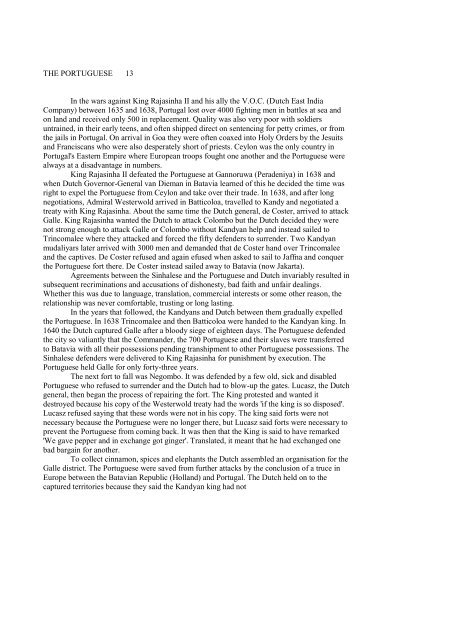Proud and prejudiced - Ferdinandus
Proud and prejudiced - Ferdinandus
Proud and prejudiced - Ferdinandus
You also want an ePaper? Increase the reach of your titles
YUMPU automatically turns print PDFs into web optimized ePapers that Google loves.
THE PORTUGUESE 13<br />
In the wars against King Rajasinha II <strong>and</strong> his ally the V.O.C. (Dutch East India<br />
Company) between 1635 <strong>and</strong> 1638, Portugal lost over 4000 fighting men in battles at sea <strong>and</strong><br />
on l<strong>and</strong> <strong>and</strong> received only 500 in replacement. Quality was also very poor with soldiers<br />
untrained, in their early teens, <strong>and</strong> often shipped direct on sentencing for petty crimes, or from<br />
the jails in Portugal. On arrival in Goa they were often coaxed into Holy Orders by the Jesuits<br />
<strong>and</strong> Franciscans who were also desperately short of priests. Ceylon was the only country in<br />
Portugal's Eastern Empire where European troops fought one another <strong>and</strong> the Portuguese were<br />
always at a disadvantage in numbers.<br />
King Rajasinha II defeated the Portuguese at Gannoruwa (Peradeniya) in 1638 <strong>and</strong><br />
when Dutch Governor-General van Dieman in Batavia learned of this he decided the time was<br />
right to expel the Portuguese from Ceylon <strong>and</strong> take over their trade. In 1638, <strong>and</strong> after long<br />
negotiations, Admiral Westerwold arrived in Batticoloa, travelled to K<strong>and</strong>y <strong>and</strong> negotiated a<br />
treaty with King Rajasinha. About the same time the Dutch general, de Coster, arrived to attack<br />
Galle. King Rajasinha wanted the Dutch to attack Colombo but the Dutch decided they were<br />
not strong enough to attack Galle or Colombo without K<strong>and</strong>yan help <strong>and</strong> instead sailed to<br />
Trincomalee where they attacked <strong>and</strong> forced the fifty defenders to surrender. Two K<strong>and</strong>yan<br />
mudaliyars later arrived with 3000 men <strong>and</strong> dem<strong>and</strong>ed that de Coster h<strong>and</strong> over Trincomalee<br />
<strong>and</strong> the captives. De Coster refused <strong>and</strong> again efused when asked to sail to Jaffna <strong>and</strong> conquer<br />
the Portuguese fort there. De Coster instead sailed away to Batavia (now Jakarta).<br />
Agreements between the Sinhalese <strong>and</strong> the Portuguese <strong>and</strong> Dutch invariably resulted in<br />
subsequent recriminations <strong>and</strong> accusations of dishonesty, bad faith <strong>and</strong> unfair dealings.<br />
Whether this was due to language, translation, commercial interests or some other reason, the<br />
relationship was never comfortable, trusting or long lasting.<br />
In the years that followed, the K<strong>and</strong>yans <strong>and</strong> Dutch between them gradually expelled<br />
the Portuguese. In 1638 Trincomalee <strong>and</strong> then Batticoloa were h<strong>and</strong>ed to the K<strong>and</strong>yan king. In<br />
1640 the Dutch captured Galle after a bloody siege of eighteen days. The Portuguese defended<br />
the city so valiantly that the Comm<strong>and</strong>er, the 700 Portuguese <strong>and</strong> their slaves were transferred<br />
to Batavia with all their possessions pending transhipment to other Portuguese possessions. The<br />
Sinhalese defenders were delivered to King Rajasinha for punishment by execution. The<br />
Portuguese held Galle for only forty-three years.<br />
The next fort to fall was Negombo. It was defended by a few old, sick <strong>and</strong> disabled<br />
Portuguese who refused to surrender <strong>and</strong> the Dutch had to blow-up the gates. Lucasz, the Dutch<br />
general, then began the process of repairing the fort. The King protested <strong>and</strong> wanted it<br />
destroyed because his copy of the Westerwold treaty had the words 'if the king is so disposed'.<br />
Lucasz refused saying that these words were not in his copy. The king said forts were not<br />
necessary because the Portuguese were no longer there, but Lucasz said forts were necessary to<br />
prevent the Portuguese from coming back. It was then that the King is said to have remarked<br />
'We gave pepper <strong>and</strong> in exchange got ginger'. Translated, it meant that he had exchanged one<br />
bad bargain for another.<br />
To collect cinnamon, spices <strong>and</strong> elephants the Dutch assembled an organisation for the<br />
Galle district. The Portuguese were saved from further attacks by the conclusion of a truce in<br />
Europe between the Batavian Republic (Holl<strong>and</strong>) <strong>and</strong> Portugal. The Dutch held on to the<br />
captured territories because they said the K<strong>and</strong>yan king had not


